#stephen of blois
Text
top most iconic/interesting bits in when christ and his saints slept that apparently actually happened in real life:
stephen of blois besieging a castle that empress matilda was in, letting her go out of a misplaced sense of gallantry once she’d surrendered, and therefore causing the entire war to drag on for years longer
empress matilda escaping stephen’s army on a whole separate occasion by dressing in a white cloak and traveling during a blizzard so she couldn’t be seen
the 14 year old future henry ii invading england with an army he put to together himself and stephen paying him to turn around and leave until he was older
john marshal barricading himself in an abbey while under attack by stephen’s forces and outlasting his enemies even when they set the abbey on fire with him inside
eleanor of aquitaine having to evade suitors while traveling through france who wanted to kidnap and forcibly marry her after her divorce from the king, instead managing to successfully marry henry ii of her own choosing
stephen taking john marshal’s youngest son hostage, threatening to hang him if his father didn’t surrender, and john marshal basically saying “go ahead and do it” because (correctly) knew that stephen wouldn’t be able to go through with murdering a child
stephen’s eldest son eustace, who refused to give up his claim to the crown even after peace had been brokered, dying on the same day that henry ii’s first son with eleanor of aquitaine was born
#history is nuts!#i love that sharon kay penman correctly understood that real history was interesting enough she didn't need to add any other drama#any ONE of these things is wild but all of them together in the same book was pretty cool#john marshal…that man was HARDCORE#pie says stuff#when christ and his saints slept#books#sharon kay penman#the anarchy#empress matilda#stephen of blois
18 notes
·
View notes
Text

13 notes
·
View notes
Photo
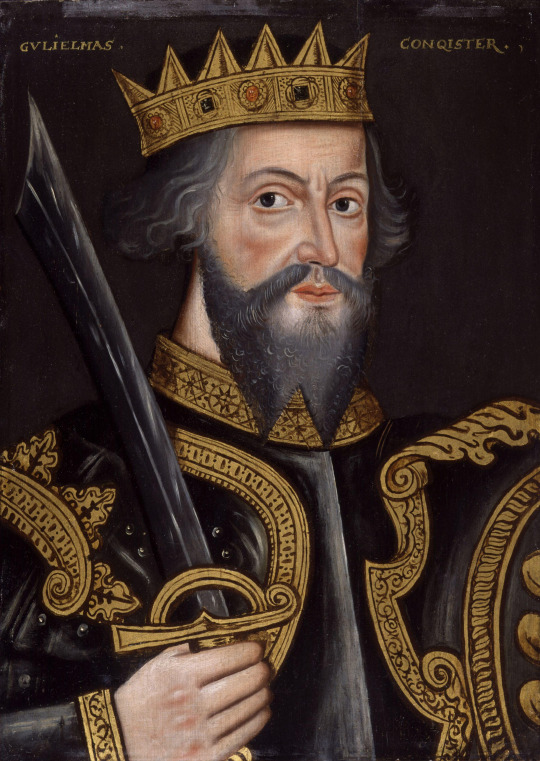


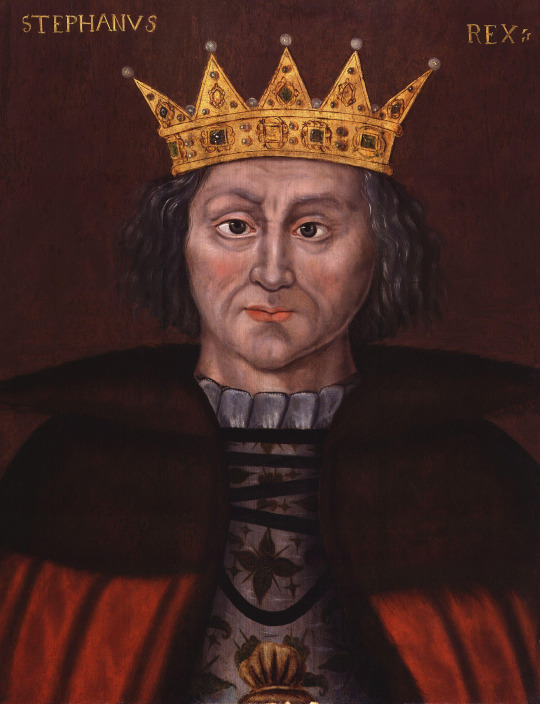
List of English Kings: The House of Normandy and the House of Blois.
#list of monarchs#english monarchs#house of normandy#william the conqueror#william the bastard#duke of normandy#duc de normandie#william ii#william rufus#henry i#henry beauclerc#stephen of blois#house of blois#maison de blois
13 notes
·
View notes
Text
He named Matilda's son as his heir, and the boy became Henry II.
"Normal Women: 900 Years of Making History" - Philippa Gregory
#book quote#normal women#philippa gregory#nonfiction#empress matilda#king stephen#stephen of blois#henry ii
0 notes
Text
0 notes
Text
So I went down a rabbit hole after the throwaway comment about England's Queen(ish) Matilda/Maud in 'Only Murders in the Building'. You get a years-long civil war known as The Anarchy in the 12th century (Cadfael times) after Henry I died without a legitimate male heir (one legitimate daughter and 24 illegitimate kids). Henry's daughter Matilda and his nephew Stephen are fighting for the throne. I maintain this period should actually be called The Bullshit for reasons including but not limited to:
Entire crisis precipitated by putting all your eggs in one basket, or in this case aristocrats in one boat. The White Ship disaster (which is caused by the passengers getting drunk on the heir's wine and wanting to race another boat) takes out, as far as I can tell, 300 people important enough to be doing international travel in 1120, including the heir to the throne and two of his half-siblings. It's a bit of a political problem.
Stephen, incidentally, was supposed to be on the White Ship but misses it because he's got the shits.
Henry I dies FIFTEEN YEARS LATER, of an honest-to-god SURFEIT OF LAMPREYS (palfreys, according to '1066 and All That'), not having managed to produce another legitimate male child despite apparently being very worried about it and marrying a second wife for this very purpose.
Stephen and Matilda basically fight to a standstill over multiple years with the amount of ridiculous capturings-and-escapings you'd expect from a children's cartoon where nobody can die and the villain has to come back next week, and not actual for-reals warfare. The country is nonfunctional while all this shit is going on. At one point Stephen just straight-up lets Matilda go, because he's too stupid to live, apparently.
Matilda gets as far as a coronation but is chased out by a hostile crowd because god forbid women do anything. She keeps the title 'Lady of the English' which is like when you don't get any more money but your job title gets fancier.
The eventual solution, that Stephen can keep the throne but Matilda's son will inherit, absolutely stinks of everyone else being sick of their nonsense and wanting it to be over. (Stephen has a son, but he's called Eustace so he's obviously shit, but nobody knows this because CS Lewis hasn't been invented yet.)
ANYWAY! That's not the point. The point is Adeliza of Louvain, Matilda's stepmother. Henry I marries her in 1121, after his first wife dies in 1118 and his only legitimate son dies in 1120. Her one job is to produce a male heir to ward off a succession crisis. He's a 54-year-old with 24 illegitimate kids who claimed the throne after his brother had a hunting accident. She's an 18-year-old who likes French poetry. They are together for fourteen years until Henry dies of eating goddamn eels in 1135. They have zero (0) children.
Henry's bits clearly work; see above re: 24 illegitimate children. Okay he's getting on, but that's not a problem for fathers the way it is for mothers. It's not like their part of the baby-making process is difficult or time-consuming.
Maybe she's tragically infertile? LOL NOPE. Three years after Henry dies, Adeliza remarries - to William d'Aubigny, who is six years younger than her. Starting in her thirties, she has seven children with him in twelve years before fucking off to an abbey.
I can only conclude Adeliza - barely an adult, married to the king of England, given the one job of Incubator With A Pulse - spent fourteen years fighting Henry off her lady parts with a shovel. As soon as she's free to marry her toyboy, she has ALL the babies, until she loses interest and does something else instead.
I want to talk to this incredible woman. I need a ouija board and someone who can speak Medieval French.
This has been an episode of Feverish History.
#Medieval history#The Anarchy#Adeliza of Louvain#Empress Matilda#Stephen de Blois#Feverish History#It's like Drunk History but you moderate your alcohol intake and also you have Covid
22 notes
·
View notes
Text
i'm bewildered by every generation of the british royal family that chooses to pick one of the super basic previously-used names for their heir presumptive. mix it up a little! make life easier for future schoolchildren!
#some good options include:#Alfred (as in Alfred the Great; downsides include having to figure out whether 21st century Al counts as the 1st or the 2nd)#Arthur (borderline religious statement. would probably cause a lot of drama)#Harold (implicit attempt to position current dynasty as rightful successors to the house of Godwin)#Richard (mildly basic but hasn't been used for an heir in 300 years. these guys seem to be unlucky so it would be funny)#Stephen (after Stephen of Blois. name your heir this to tell your relatives ''we're coming for your thrones'')
1 note
·
View note
Note
The truth about Alicent Hightower: why is she so disliked?
https://youtu.be/t9HjamrAMfU?si=QpoUMPQQSuTWmovz
I found this video on YouTube. I didn't watch the video, but I did read the comments, and many of them were negative toward Alicent. I want to know your thoughts on this video.
The comments are negative towards Alicent because the creator's request for engagement consisted of asking her audience to share why they disliked Alicent. Though I do feel inclined to enquire myself: why are you asking me to react to this video if you haven't even watched it?
Many of these talking points I have already addressed in my lengthy meta posts over time:
There is a conflation of Alicent from the books and Alicent from the show. Show!Alicent was not sent to comfort Jaehaerys and is more innocent and trusting that book!Alicent because she is younger.
Alicent is hated by many viewers for "seducing" Viserys. The creator says she doesn't and denies that people blame her for that, but they do. It's an easily-verified, observable reality and, thus, a strange thing to even say.
Jace/Helaena is not an advantageous marriage for the greens.
"Why was Otto spying on Rhaenyra?" It's literally his job. "He deserved to be fired". It's literally his job to be spying on everyone and report the information back to the King.
The Hightowers are faced with the fait accompli that Aegon will not be named heir. They went into the marriage fully believing that Alicent's sons would overtake Rhaenyra in the line of succession, as was the social norm.
It ultimately comes back to what I was talking about these last few days. This is the result of a conflation of several factors:
ignorance about what medieval social and economic arrangements actually were (what is feudalism? what is manorialism?);
stubbornly clinging to the notion that Westeros is an absolutist monarchy and that "the King's word is law";
downplaying the bastard issue, i.e. refusing to acknowledge how concerning the division of the marital estate was to inheritors and blaming it entirely on misogyny-fueled sex-negativism;
having no concept of what common law is or how it functions.
People can't let go of this image that Westeros is a capitalist modern state with an authoritarian leader (the King). And dragons. (It's Russia, basically. The dragons are bears).
Most of TB's discourse contains some combination of the above, which is why, honestly, at this point, if people are so invested in still talking about this, I would truly suggest a primer in medieval history, because this is getting ridiculous. These reasonings are just not rooted in a tangible basis of reality and trying to engage with them is like fighting windmills.
In the same vein, I wish people would stop bringing up the point of Alicent misunderstanding that Viserys changed his mind on his death bed. I get it, you think it's a dumb argument, but, lo' and behold, it's actually lifted straight from real history and, to the shock of thousands of Twitter users, it worked. What now? Stephen of Blois truly is crying in the afterlife because you think this little trick of his lacks realism. 🤦♀️
#they don't understand how much modern institutions shape their daily lives#institutions which are totally absent from westeros#it doesn't even have a parliament#'pass a law' pfffff#anti rhaenyra targaryen#anti team black#alicent hightower#there is also the refusal to accept that rhaenyra has any power over her own situation#and that she also could have made better choices both for herself and for the realm#'what was rhaenyra to do?' renounce being heir! or be smarter about it!#girl pick a struggle fr#ask#anon#also. like. you have to laugh at OP's characterization of rhaenyra being groomed by daemon during their night out in town#& then coercing criston into sex#as 'her living her best life'
38 notes
·
View notes
Text


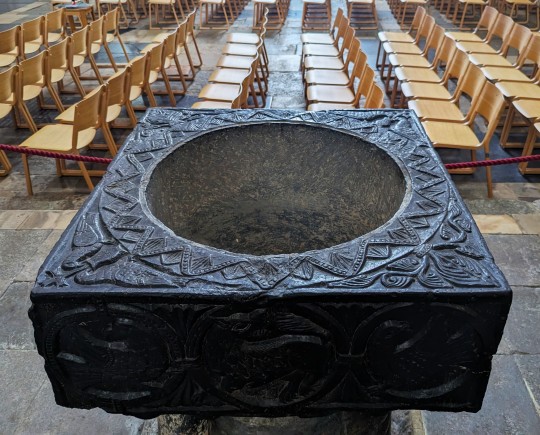
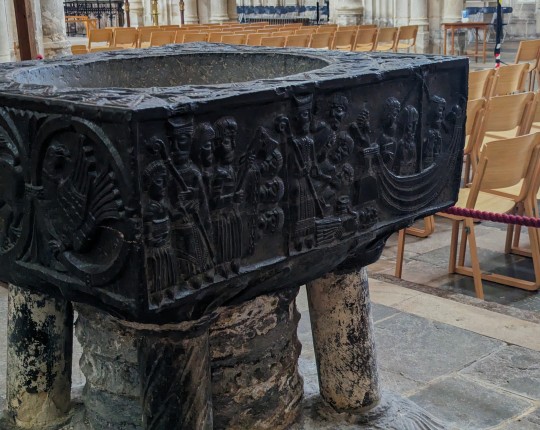
The Tournai Font from Tournai, Belgium dated to the Mid 12th Century on display at Winchester Cathedral in Winchester, England
The font is made from Tournai marble in Belgium and depicts scenes from the Miracles of St Nicholas of Myra on it's four sides. It was thought to have been commissioned by Bishop Henry of Blois in Belgium and shipped out to England in parts to be assembled upon arrival. The font is still used today for baptisms and Winchester Cathedral.
Henry of Blois was the younger brother of Stephen of Blois the king of England from 1135 to 1154. Despite his brother being king he initially supported the Holy Roman Empress Matilda during the Anarchy. However he later changed sides to support his brother and led a successful defence of Winchester from the Empresses forces.
Photographs taken by myself 2023
#archaeology#art#history#england#english#medieval#blois#12th century#winchester cathedral#winchester#barbucomedie
39 notes
·
View notes
Text
I’m a real blogger I got my first hate comment 🥹

This is from my post about Jaehera’s death and her deserving better.
I’ll admit where I’m wrong, the dance isn’t based entirely off the war of the roses but more about Empress Matilda/Maude and her cousin Stephen of Blois during the time called the Anarchy. This war is actually about sexism keeping a woman off the throne in favor of her male family member and ends with her son inheriting the throne as her cousin’s heir. The similarities are Matilda’s young brother dying young and her father naming her heir with the lords swearing to follow her. But unlike Viserys, her father doesn’t remarry and cause an entire succession crisis. The war of the roses influence comes from both sides fearing their complete destruction so the other side won’t have claimants threatening their rule later on.
On to the other points of your ‘argument’.
1. Team green is salty that the blacks carry on the targ line.
Nope, I’m anti Targaryens as they are terrible rulers who end their own dragons, kingdom, and dynasty through pure stupidity (I know there’s more than them being stupid but shhh).
Rhaenyra’s line gave us Aegon the unworthy and the black fire rebellions along with the war of the 9 penny kings which did way more danage to the kingdom than any other conflict. You also get Aerys the mad king, Daeron the young dragon who gets himself killed cause he thought he could beat the dornish, Baelon the blessed a man so chaste he literally locks his sisters up so he won’t fuck them, and Rhaegar a man so obsessed with prophecy he runs away with a teenager and leaves his wife and children to be viciously murdered.
2. You don’t hate Jaehera, you just make fun of her for how we react.
What the fuck kind of reasoning is that? You make fun of a kids death cause people care?? Wow. Just wow.
3. A family continues a dynasty so there for they’re right.
I guess Tywin is the greatest of all time cause his grandkids get to be kings without any Baratheon blood.
Also that means that Vaemond was right cause his Granddaughter got to be queen.
4. Complain to George.
Nah the old man has enough distractions and doesn’t need to be bothered with this.
5. My three strong boys are the reeaaaly innocents.
Hah. Jace and Luke are not innocent. Luke cut out Aemonds eye and Jace was a big part of the war effort.
Jeoffrey, Jaehearys, and Maelor are completely innocent. Jeoffrey was killed by his mom’s dragon, Jaehearys was killed by Daemon’s assassins, and Maelor was killed on Rhaenyra’s orders.
So anyways hope we learned a valuable lesson on fuck around and find out. See y’all next time!
#house of the dragon#hotd#hotd discussion#team green#anti team black#tw team black#Jaehera Targaryen#jaehearys targaryen#maelor targaryen#justice for Jaehera#justice for Jaehearys#justice for Maelor#jace velaryon#luke velaryon#Jeoffrey valaryon#Luke deserved it
83 notes
·
View notes
Note
Aegon III and Jaehaera “healing together” would be like:
Jaehaera: I miss my father.
Aegon III, having a PTSD trigger: Well, I miss my mother! AND YOU KNOW WHO GRUESOMELY KILLED MY MOTHER WHILE I WAS WATCHING ?!
Jaehaera: And I miss my twin brother! AND YOU KNOW WHO SEND THE MEN WHO BEHEADED HIM IN FRONT OF ME & MY MOM ?!
Aegon III: Nothing would have happened if your grandmother didn’t usurped my mother and your uncle didn’t ruthlessly murdered my brother.
Their marriage would have been SOOO INCREDIBLY UGLY, BITTER, MISERABLE AND HOPELESS. That union never stood a chance. Aegon III spent about 3 years married to her and never made any attempt to befriend her and had more interactions with Unwin Peake’s daughter than her. They wouldn’t have any children, he’d abdicate in favor of Viserys if he didn’t marry Daenaera and then locked himself in a tower.
Yeah, I agree. I understand that the real English War of the Roses that war/sub-battles ended with a happier and successful marriage between the two warring houses of York and Lancaster so it seems that Aegon III and Jaehaera could have also had a great marriage--or at least a civil one with a lot of kids/heirs. However, though yes we had the structure of "one child of the two warring families marry for peace" of the War of Roses, the Dance was modeled and takes inspiration from the Anarchy. Where Empress Matilda fought against her male cousin, Stephen of Blois, for the English throne. Where the conflict was strictly about who deserves the throne: the female declared heir or the eldest male relative? And who will obtain it, who fights for them, who suffers, etc.
Plus Henry VII of the Plantagenet branch of Tudor (through Jon of Gaunt) & Elizabeth of the house of York--the people who married each other while from the opposing houses after the Battle of Bosworth Field--were both relatively healthy adults AND Henry actually won the throne through his own leadership in battle after killing Richard II (her paternal uncle). The same uncle whose mainly held responsible for Elizabeth's younger brothers' disappearances. So Henry & Elizabeth had a way better beginning than Aegon III & Jaehaera.
Even with the Anarchy, GRRM doesn't transfer all of the events or major ones/results into his fiction. The conclusion of the anarchy was still a woman being passed over: Stephen won and got to rule but Empress Matilda's son--Henry Plantagenet-- was designated as the next to rule in the Treaty of Wallingford. She wasn't brutally murdered in front of said son like Rhaenyra, and despite Stephen's efforts his own sons never sat the throne. But the war ravaged England as the Dance did Westeros enough that in both the lords/barons sought peace above all AND Matilda lost the throne. GRRM seemed to want to capture the sense of futility of the war's destruction. There was no happy-dappy marriage or even an attempt at one in the real thing.
Jaehaera was made totally disadvantaged for a reason:
a) making her and Aegon both children in the aftermath of the war, controlled by ambitious adults still who do not have their best interests at heart makes to highlight theie vulnerability and the cause being misogyny and classism leading those in power to declare such wars
b) their parents fighting and destroying each other to the bitter end instead of what occurred in the actual Anarchy
c) the greens pushed for war under the principle of "men only" at the cost of its female members' mental and physical health or putting those in danger (mainly Helaena and Jaehaera) for the sake of power. Jaehaera could have grown up happier and for longer if her own father hadn't decided to calm down and not try to go after several of Rhaenyra's supporters in the way that he was planning to, nor should he have usurped his older sister. He shouldn't have celebrated Lucerys' murder at the feast he threw that was almost certainly part of the inspiration for Blood & Cheese whereby his oldest male heir was killed. His other male heir was put into danger when he, again, usurped Rhaenyra and led armies against her when she had been already declared and ACCEPTED as Viserys heir for years. All he had left was his daughter left, but bc the whole point of his claim was "males only" AND he was himself an asshole, he decided to marry again to get another male heir. It was also Alicent who tried to intimidate or persuade her granddaughter to kill Aegon as if the child wasn't already scarred from war and mentally fragile from her disabilities so that she, Alicent, could get revenge against the already dead Rhaenyra. The greens, not the blacks or Rhaenyra, are the main ones at fault for Jaehaera's demise--her death is on their hands since every which way, they chose power over her.
#asoiaf asks to me#aegon iii#jaehaera targaryen#fire and blood characters#asoiaf#fire and blood#aegon iii's characterization#aegon iii and jaehaera#english history#medeival history#war of the roses#the anarchy#fiction vs reality#the dance of dragons#fire and blood writing
32 notes
·
View notes
Text
Sejak 8
This show has officially hit "I'm just screaming the whole episode" status. Would I have loved for their first make-out session to be before he knows she's a woman? I mean, sure, but the way this scene shook out was basically perfect, as the waves of understanding wash across JJS's face and Hee Soo fully gives in to the part of her heart she's been trying to deny for three years. It's just so deliciously complex and contradictory, for both of them, their desire and love for each other woven through all those layers of deception and betrayal and scheming.
On the subject of betrayal, though... Like many people on this website, I agree that Yi In plans to make his nephew his heir and is working to discover who killed his brother. It's become increasingly obvious, but I kind of clocked it from the time jump, when it's established that in spite of a decently well-populated inner court, the man doesn't have a single child. If he had been sincere in stealing the throne for himself, surely his first priority would be to have his own son, which could then leave him free to dispose of his nephew, who living is always going to be a threat to his rule.
Now, I have nothing against the nephew. It's just that, as I have established, I think usurpation is quite sexy (unless a man is trying to usurp a woman, which is why Stephen of Blois can get fucked), and I would have loved for Yi In to be a true usurper. Monarchy is all bullshit anyway, right? To me, usurpation is like an acknowledgement that it's bullshit: if the occupant of the throne is solely determined through mistakes of nature, why shouldn't humans be able to seize destiny in their hands and take what they want? If the only qualification is being born to a certain parent at the right time, then why not just change that rule to suit your own intention? Especially when nature more often than not gets it wrong: it's hard to respect the legitimacy of Grand Prince Munseong, given that he is the heir of a man who clearly never should have been king.
But no, clearly we have to have Yi In be a noble leading man, so even if he does some bad things, it's in service of a worthy and legitimate goal. I don't hate it, I just liked it more for that one enchanted episode where it seemed like he might go full anti-hero. As it is, I guess I'll have to settle for him being a super-complicated and conflicted man played by an incredible actor, poor me!
(It's true that it hasn't been established for sure that Yi In took the throne for noble reasons, but to me that does very much look like where it's going.)
#no i really do love this show i just love usurpers more lol#yi bang won and kim deokman you are the only people who have ever understood me#also this is why i am alone on my island of not liking the princess's man because i was rooting for sejo!#i will always love a character who knows what they want and takes it#probably because i so indecisive myself tbh#sejak#my commentary#captivating the king
23 notes
·
View notes
Note
Hello, I wanted to ask, since you know so much about history, do you think there is any historical figure that Alicent Hightower may have been partially inspired by? or something similar to her story?
Well, there's any number of powerful ambitious noblewomen and royalty who fought to get their children introduced into or bumped up the line of succession, so you have to narrow in from there.
Given how much GRRM cribbed from the Anarchy for the Dance, I would say that her political position in the Green camp is roughly equivalent to Matilda of Boulogne - although Matilda was Stephen of Blois' wife, not his mother. Stephen's mother was both of royal blood - she was Adela of Normandy, daughter of William the Conqueror - and died really early into the Anarchy and didn't really play the same coordinating role that Matilda did when Stephen was held prisoner.
Also, as @goodqueenaly will no doubt remind me, there's probably someone in the Rois Maudits who would also be a good fit.
35 notes
·
View notes
Text
so there are quite a few ways to refer to monarchs, right? those include:
regnal number (james iiiii, edward lxix, and so on)
surnames, like stewart or plantagenet
dynastic names, or at least what we people of the present have retroactively made into dynastic names, like tudor or plantagenet (plantagenet was only used as a surname by the plantagenets for the last five minutes of its rule)
epithets, like richard the lionheart, alfred the great, cnut the great, bloody mary, and edward the average, except not edward the average
locative bynames (bynames essentially being the predecessor to surnames and denoting a specific characteristic of a person; very close to epithets in some scenarios, but essentially nicknames), like edward of caernarfon or edward of windsor. these don't get used much by monarchs, as they tend to be dropped in favour of a regnal number. the most famous example of this is probably stephen of blois
patronymics... very rarely. harold godwinson is the only case of this i can think of
occasionally, titles - some kings were not born heir to the throne, and as such are sometimes known as james, duke of york, or henry, earl of richmond, especially when discussing their pre-accession lives
and nicknames! epithets tend to be a bit more lofty than these, which are usually boring french descriptors - william rufus, henry beauclerc and henry curtmantle are the only real examples i can think of. technically, epithets are the same thing, but curtmantle is far too boring to be considered an epithet in good faith, if you ask me
why do i list all these? because they make referring to a monarch a lot easier. one king, rather irritatingly, defies most of these descriptors: king john. on his own wikipedia page, he's called "john, king of england." it's not that he didn't have a byname - he did: john lackland. but if you're trying to discuss him without insulting him all the way through, it's not very appropriate. he doesn't have a surname, because john plantagenet a) wasn't used and b) sounds awful. he doesn't have a patronymic or locative byname, because john of oxford is also crap, not to mention confusing. he didn't have a noble title, because - well, lackland. and most frustratingly, he doesn't have a regnal number, because he was such a bad king that no heir to the throne was ever named john before or after him. (this may have had something to do with the fact that english kings were obsessed with henry and edward.) so basically the only decent way to refer to him is king john, or john, king of england, which, like everything else, sounds crap. fuck you, john.
14 notes
·
View notes
Text
Ages of French Queens at First Marriage
I have only included women whose birth dates and dates of marriage are known within at least 1-2 years, therefore, this is not a comprehensive list.
This list is composed of Queens of France until the end of the House of Bourbon; it does not include Bourbon claimants or descendants after 1792.
The average age at first marriage among these women was 20.
Ermentrude of Orléans, first wife of Charles the Bald: age 19 when she married Charles in 842 CE
Richilde of Provence, second wife of Charles the Bald: age 25 when she married Charles in 870 CE
Richardis of Swabia, wife of Charles the Fat: age 22 when she married Charles in 862 CE
Théodrate of Troyes, wife of Odo: age 14 or 15 when she married Odo in 882 or 883 CE
Frederuna, wife of Charles III: age 20 when she married Charles in 907 CE
Beatrice of Vermandois, second wife of Robert I: age 10 when she married Robert in 990 CE
Emma of France, wife of Rudolph: age 27 when she married Rudolph in 921 CE
Gerberga of Saxony, wife of Gilbert, Duke of Lorraine, and later of Louis IV: age 16 when she married Gilbert in 929 CE
Emma of Italy, wife of Lothair: age 17 when she married Lothair in 965 CE
Adelaide-Blanche of Anjou, wife of Stephen, Viscount of Gévaudan, Raymond III, Count of Toulouse, and later Louis V: age 15 when she married Stephen in 955 CE
Bertha of Burgundy, wife of Odo I, Count of Blois, and later Robert II: age 19 when she married Odo in 984 CE
Constance of Arles, third wife of Robert II: age 17 when she married Robert in 1003 CE
Anne of Kiev, wife of Henry I: age 21 when she married Henry in 1051 CE
Bertha of Holland, first wife of Philip I: age 17 when she married Philip in 1072 CE
Bertrade of Montfort, wife of Fulk IV, Count of Anjou, and second wife of Philip I: age 19 when she married Fulk in 1089 CE
Adelaide of Maurienne, second wife of Louis VI: age 23 when she married Louis in 1115 CE
Eleanor of Aquitaine, first wife of Louis VII and later Henry II of England: age 15 when she married Louis in 1137 CE
Adela of Champagne, third wife of Louis VII: age 20 when she married Louis in `1160 CE
Isabella of Hainault, first wife of Philip II: age 10 when she married Philip in 1180 CE
Ingeborg of Denmark, second wife of Philip II: age 19 when she married Philip in 1193 CE
Agnes of Merania, third wife of Philip II: age 21 when she married Philip in 1195 CE
Blanche of Castile, wife of Louis VIII: age 12 when she married Louis in 1200 CE
Margaret of Provence, wife of Louis IX: age 13 when she married Louis in 1234 CE
Isabella of Aragon, first wife of Philip III: age 14 when she married Philip in 1262 CE
Marie of Brabant, second wife of Philip III: age 20 when she married Philip in 1274 CE
Joan I of Navarre, wife of Philip IV: age 11 when she married Philip in 1284 CE
Margaret of Burgundy, wife of Louis X; age 15 when she married Louis in 1305 CE
Clementia of Hungary, second wife of Louis X: age 22 when she married Louis in 1315 CE
Joan II, Countess of Burgundy, wife of Philip V: age 15 when she married Philip in 1307 CE
Blanche of Burgundy, first wife of Charles IV: age 12 when she married Charles in 1308 CE
Marie of Luxembourg, second wife of Charles IV: age 18 when she married Charles in 1322 CE
Joan of Évreux, third wife of Charles IV: age 14 when she married Charles in 1324 CE
Bonne of Luxembourg, first wife of John II: age 17 when she married John in 1332 CE
Joan I, Countess of Auvergne, wife of Philip of Burgundy, and later John II: age 12 when she married Philip in 1338 CE
Joanna of Bourbon, wife of Charles V: age 12 when she married Charles in 1350 CE
Isabeau of Bavaria, wife of Charles VI: age 15 when she married Charles in 1385 CE
Marie of Anjou, wife of Charles VII: age 18 when she married Charles in 1422 CE
Charlotte of Savoy, second wife of Louis XI: age 9 when she married Louis in 1451 CE
Anne of Brittany, wife of Maximilian I, HRE, Charles VIII and later Louis XII: age 13 when she married Maximilian in 1490 CE
Joan of France, first wife of Louis XII: age 12 when she married Louis in 1476 CE
Mary Tudor, third wife of Louis XII: age 18 when she married Louis in 1514 CE
Claude of France, first wife of Francis I: age 15 when she married Francis in 1514 CE
Eleanor of Austria, wife of Manuel I of Portugal and later second wife of Francis I: age 20 when she married Manuel in 1518 CE
Catherine de' Medici, wife of Henry II: age 14 when she married Henry in 1533 CE
Mary, Queen of Scots, wife of Francis II: age 16 when she married Francis in 1558 CE
Elisabeth of Austria, wife of Charles IX: age 16 when she married Charles in 1570 CE
Louise of Lorraine, wife of Henry III: age 22 when she married Henry in 1575 CE
Margaret of Valois, first wife of Henry IV: age 19 when she married Henry in 1572 CE
Marie de' Medici, second wife of Henry IV: age 25 when she married Henry in 1600 CE
Anne of Austria, wife of Louis XIII: age 14 when she married Louis in 1615 CE
Maria Theresa of Spain, wife of Louis XIV: age 22 when she married Louis in 1660 CE
Marie Leszczyńska, wife of Louis XV: age 22 when she married Louis in 1725 CE
Marie Antoinette, wife of Louis XVI: age 15 when she married Louis in 1770 CE
37 notes
·
View notes
Text
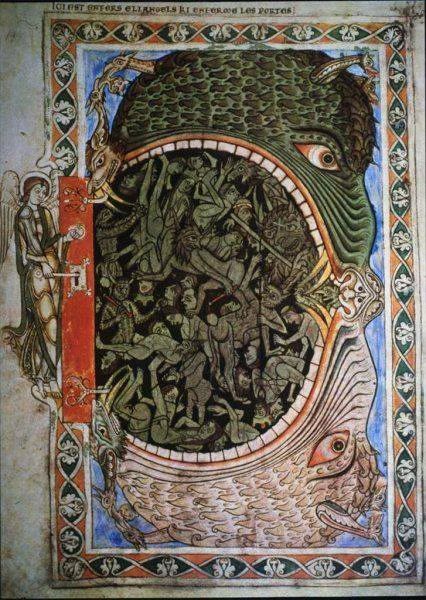
The Harrowing of Hell from the Winchester Psalter (Winchester, Priory of St Swithun, c 1150 CE): An angel locking the door of Hell. Hell is represented as a great mouth within which are human beings and devils.
British Library, London, MS Nero C IV, f. 39r
The book also includes a Calendar, which provides evidence as to its origin. Saints of particular relevance to Winchester are included, among them Bishops Æthelwold (d. 984) and Brinstan (d. 934), and saints buried or with shrines there, such as Eadburh (d. c. 951), a Benedictine nun and daughter of Edward the Elder, and Grimbald (d. 901?), by tradition the co-founder of New Minster (later Hyde Abbey). The Calendar also includes two abbots of Cluny in Burgundy, Sts Hugh (d. 1109) and Mailous (d. 994).
The bishop of Winchester throughout the middle of the 12th century was King Stephen’s younger brother, Henry of Blois (r. 1139–71), who had been educated at Cluny. Henry was one of the richest men in Europe and a known art and relic collector. When appointed to the see of Winchester, he refused to relinquish the profitable abbacy of Glastonbury, which he held concurrently with Winchester until his death. The Cluniac references, Cathedral-specific prayer and Henry’s great wealth make him a plausible patron for such a lavish book, even if its vernacular components and central focus on the Psalms in French suggests that he may have intended it as a gift for a layperson.
[Robert Scott Horton]
* * * *
“The gates of hell are open night and day;
Smooth the descent, and easy is the way:
But to return, and view the cheerful skies,
In this the task and mighty labor lies.”
― Virgil, The Aeneid
+
“They say that in the second before our death, each of us understands the real reason for our existence, and out of that moment, heaven or hell is born.”
― Paulo Coelho, Aleph
14 notes
·
View notes